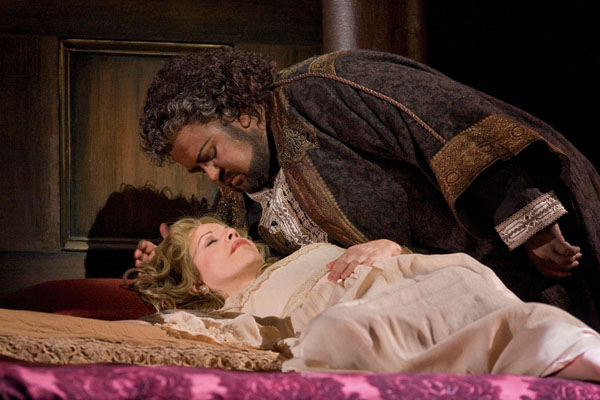The legend of Faust is perhaps the dominant one in post-Renaissance Europe, yet it resists satisfactory artistic realisation. The most celebrated versions of the legend, such as Marlowe’s and Goethe’s, seem to me to be utter messes aesthetically, retaining their status through the great passages they include rather than through any coherence. Thomas Mann’s Dr Faustus is a very great novel with a fundamental structural flaw. Of the major musical treatments, Berlioz’s contains the largest amount of superb music; Boito’s Mefistofele is high-minded but a bit of a bore; Busoni’s obstinately refuses to rise to its key moments with sufficiently impressive music, so remains a regrettably fringe work; while Gounod is in the dog-house, though it isn’t hard to argue that as a whole his opera is more of a success than anyone else’s on the subject. But if asked to give a short list of the greatest operas there’s surely no one today who would include Gounod’s among them.
In Opera North’s new production by Ran Arthur Braun and Rob Kearley we have an attempt to take Gounod seriously — well, sort of — by bringing the action up to date and drastically altering its centres of interest. That strikes me as fine, given that it’s so hard to say what Faust’s or Faust’s centre of interest is: wanting eternal youth? Wanting to know more than it is fitting for a human being to know? Testing what kind of temptation one might be able to resist, supposing one were offered a period of sublime happiness, or genius, followed by an eternity of hell?
Faust begins, surely no one will deny, with an impressive prelude, so impressive that I’ve played it on record to many people and they haven’t had the least idea what it was. We see the old Faust despairing of having any further worthwhile life — and surely this is powerful and convincing? In prances Mephistopheles and things perk up, but the opera never regains the promise of seriousness with which it opened. That’s a pity, but given that Gounod is so inclined to the sanctimonious, of which there is anyway more than enough, we may as well settle for what he also offers, a shrewd selection of scenes which include the touching, the amusing, the erotic and — unfailingly — the melodious. Admittedly you can say that everything he does Bizet and Massenet between them do better, but he did it first, and often pretty well.
Braun and Kearley take the opportunity to see Faust as a commentary on contemporary politics, religious fundamentalism — Marguerite heads for an abortion clinic and brings out the pro-lifers — and assorted other targets which, like them, I would love to see annihilated. But the music isn’t really suitable to accompany satire. So though the standard of acting is high, the disjunction between what we see and what we hear is too great. There is much use of video projection, too, which is enjoyable and cost-saving, but that tends to add to a creeping confusion as to what exactly is going on.
Still, the musical level is impressive, above all the superbly saturnine and funny Mephistopheles of James Creswell. Peter Auty can cope with all Faust’s lyrical passages, as well as being, in a plausible way, an ageing manager who has lost his way. And Juanita Lascarro contrives to be very sexy as Marguerite, but virginal too. They combine to make the trio as thrilling as it ought to be, enough to make one forget some preceding longueurs, in a production that is already cut. Stuart Stratford conducts with immense élan. I was shocked by the number of empty seats at only the second performance.
The second of the Met’s cinema relays this season was Verdi’s Otello, in the monumental production of Elijah Moshinsky. It would probably have been much better heard rather than seen, for the Otello of Johan Botha defies belief. He seems to be incapable of any facial expression, and one can only applaud Renée Fleming for the ardour of her responses to him, that included, much to the benefit of Desdemona’s character, extremely spirited resistance to Otello’s bullying, especially in the last act, when her struggle to stay alive was gripping in a way one rarely experiences in an opera.
Botha’s voice, after a cold, was in fine shape, and though Fleming no longer commands the creamy tones that took her to stardom, she has presence, intensity, conviction, and would have even more if she would ration her smiles. Falk Struckmann was a problematic Iago: he, too, was in good voice, but he hammed up his role to the point of absurdity, rolling his eyes, exaggerating his every gesture, so that even someone as stupid as Otello would surely have seen through him. Semyon Bychkov’s conducting was something less than I had hoped. The opening storm lacked ferocity from the orchestra, and terror from the chorus. Acts III and IV were superior to the first two, but if we are going to live with close-ups then appearance will have to become a first consideration.






Comments